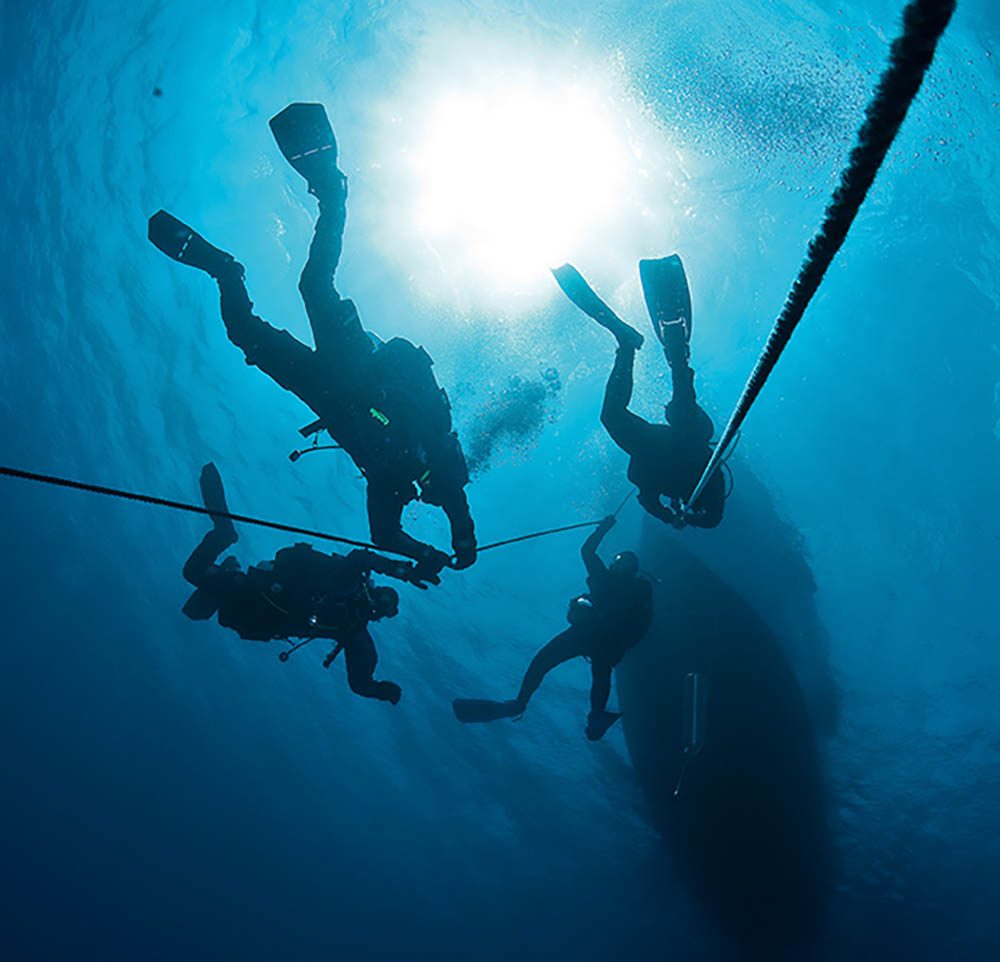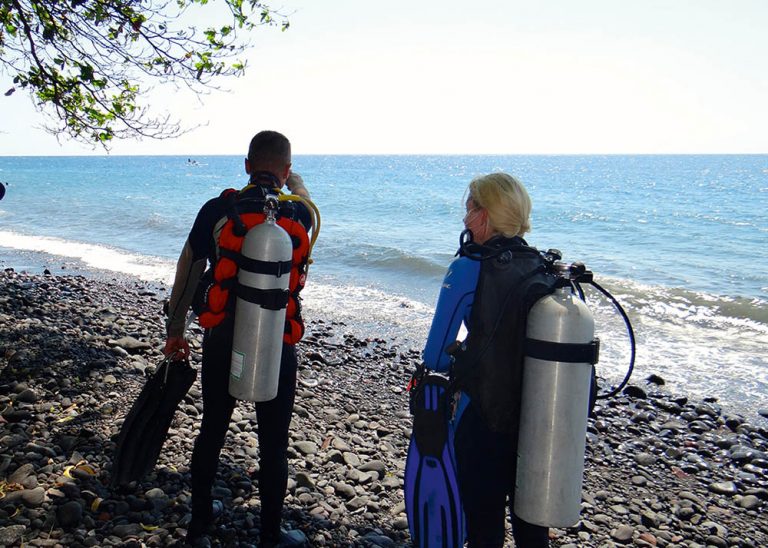To Divemaster and Beyond
Tell a commercial diver training agency that you want to be an instructor and it will extend a warm welcome, says SIMON PRIDMORE. Just don’t kid yourself that you’re submitting a job application – you’re buying a product.

Appeared in DIVER May 2019
DO I HAVE WHAT IT TAKES to be a full-time dive professional –or even just start a scuba side-hustle?”
This is a thought that crosses the mind of many divers at some point in their diving lives. The enticing concept that a keen diver can turn a hobby into a career is one that is promoted heavily by commercial training agencies. They make good money from instructor courses.
If you walk into a dive-centre with more than a few dives under your belt and say you’re thinking of “going pro”, nobody will turn you away. There is no assessment process; no enrolment interview; no talent-spotting.
The fact that you are accepted as a candidate for a dive instructor course does not mean that someone has seen that you have the right attitude, aptitude and personality. You have to decide this yourself, which is why I thought an article on the topic would be useful.
You are not submitting a job application when you say you want to become a dive instructor – you are buying a product. And the agencies are very good at delivering this product.
Very few people fail an instructor course.
However, not many people subsequently succeed in forging a long-term career in scuba-diving. Most quickly decide that the life of a scuba professional is not for them after all.
So, what are the requirements? What do you require to have a good shot at a full-time or part-time career in diving?
Here is a short summary of what I see as the key factors:
DIVE TECHNIQUE
Your personal diving skills need to be excellent and instinctive, so that you can devote 100% of your attention to the divers in your charge.
But good technique alone does not make you a good dive instructor.
KNOWLEDGE
Your diving knowledge should be well beyond the level you are teaching.
Simply reading the material the night before the class is not enough. Scuba-diving students are not passive drones. Many will be smarter than you and will have informed questions.
It is very helpful also to have some knowledge of related fields, such as marine biology, human physiology or gas physics.
EXPERIENCE
You should have experience of a variety of types of diving and diving environments. Your breadth of experience will be more valuable than the number of dives you have done. You will find yourself drawing on this when you need to find a context to illustrate a teaching point.
VOCATION
You need to have a teaching vocation. If you have done teacher-training, are a teacher or trainer in another walk of life and like what you’re doing, so much the better.
As a dive instructor, you will spend most of the time teaching. If you don’t get excited at the prospect of passing on the joy of the sport and seeing divers’ eyes light up when they conquer their fears and “get it,” then you won’t remain a dive instructor for long.
The other reason I place vocation high on this list is that jobs in scuba-diving are not well paid, so you will need to have the same sort of dedication that other professionals such as nurses or school-teachers have, to endure long, difficult working hours for little financial reward.
PEOPLE SKILLS
 A dive professional has to be a people person, because their whole day is spent interacting with people. Many scuba instructors in the early days were not so much people who liked people as people who liked ordering other people around.
A dive professional has to be a people person, because their whole day is spent interacting with people. Many scuba instructors in the early days were not so much people who liked people as people who liked ordering other people around.
Today, the world of scuba-diving is very different. Sympathy and empathy are the key words; if you can develop bonds easily and have the capacity to understand what someone is experiencing from within their frame of reference, you’ll make a good instructor.
CALM
Groups of divers are composed of free-thinking, unpredictable, excitable individuals who can disrupt your carefully laid plans in an instant. The limits of a dive instructor’s ability to remain calm are tested every day.
TIME-MANAGEMENT
It is crucial for a dive instructor to know how to manage time. Whether you’re teaching a course or leading a group of divers, you’re always limited by time. You have to exercise time discipline yourself and see that your students and customers do likewise, all without spoiling the fun. It’s a tough balance to achieve.
EMPLOYABILITY
If you see becoming a dive instructor as an opportunity to leave home and head for an exotic tropical destination, you will find plenty of job vacancies. Dive instructors often burn out or move on.
Recognise, however, that you will be competing in an international job market in which everyone has your diving qualifications and more. To find work you must have other strings to your bow too.
The ability to speak a number of languages is very useful, as is a work background as a mechanic or in the hospitality, service or travel industries.
If you plan to stay at home and teach diving part-time, your success will depend on finding a local dive-centre to teach through, and coming up with a hitherto-untapped source of potential scuba-diving students, beyond your family and friends. Have a viable plan before embarking on your instructor course.
FITNESS
You need to be physically and mentally fit. Full-time instructors dive 15-30 times a week, and work long hours.
A lot of that time involves hauling gear and loading or unloading trucks and boats. They are also “on stage” for much of the time, keeping the customers happy and entertained.
There is not much downtime and, in high season, very little time off.
THE DIVEMASTER MYTH
There are other professions in the scuba-diving world, such as journalism, travel or resort management, but the entry point for most dive professionals is instructor.
You might not want to teach, just to be a dive-guide or divemaster. Unfortunately, although the training agencies refer to divemaster as a professional qualification, in practice it is almost impossible to find a paid job in scuba-diving if you are not at least an instructor.
Generally, the only people without instructor qualifications who work as guides or divemasters are those from countries where economic levels are much lower than in the West.
These folk earn extremely low salaries and can’t afford instructor-training fees which, wherever the courses are run, are set at first-world levels.

